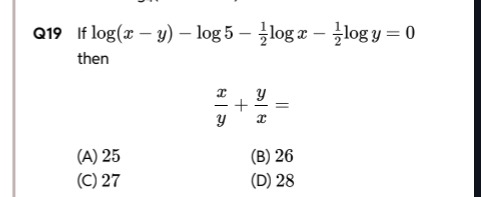Question
Question: If $\log(x-y) - \log 5 - \frac{1}{2}\log x - \frac{1}{2}\log y = 0$ then $\frac{x}{y} + \frac{y}{x}...
If log(x−y)−log5−21logx−21logy=0 then
yx+xy=

A
25
B
26
C
27
D
28
Answer
27
Explanation
Solution
The given logarithmic equation is log(x−y)−log5−21logx−21logy=0.
Using logarithm properties logA−logB=log(A/B) and clogA=log(Ac), and logA+logB=log(AB):
log(x−y)−log5−21(logx+logy)=0
log(x−y)−log5−21log(xy)=0
log(x−y)=log5+log((xy)1/2)
log(x−y)=log(5xy)
Equating the arguments:
x−y=5xy
For the logarithms to be defined, x>0, y>0, and x−y>0, which implies x>y.
Divide the equation by y (since y=0):
yx−1=5yx
Let t=yx. Since x>y, t>1. Substituting t:
t2−1=5t
t2−5t−1=0
We need to find yx+xy, which is t2+t21.
Divide the quadratic equation by t (since t=0):
t−5−t1=0
t−t1=5
Square both sides:
(t−t1)2=52
t2+t21−2=25
t2+t21=27
Thus, yx+xy=27.
